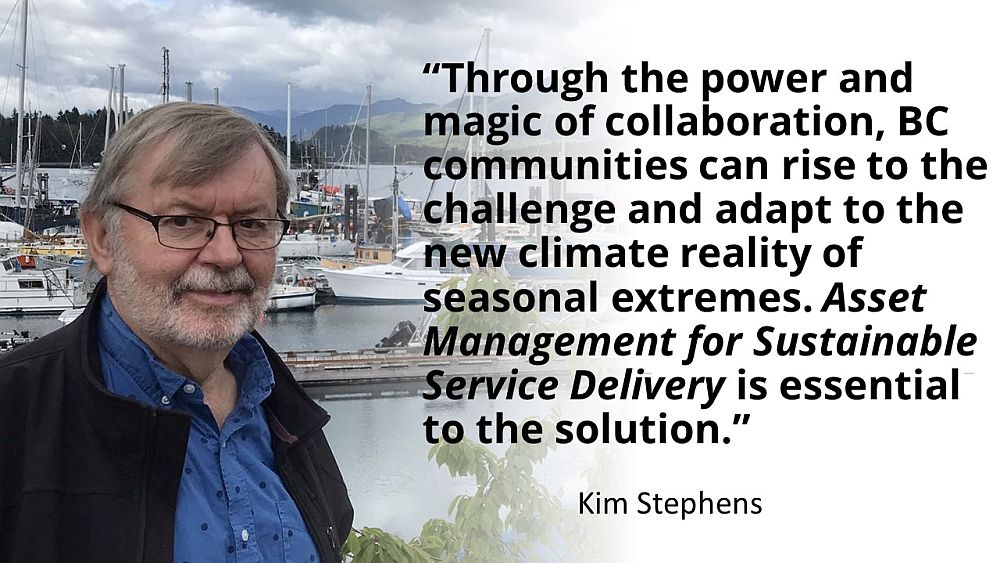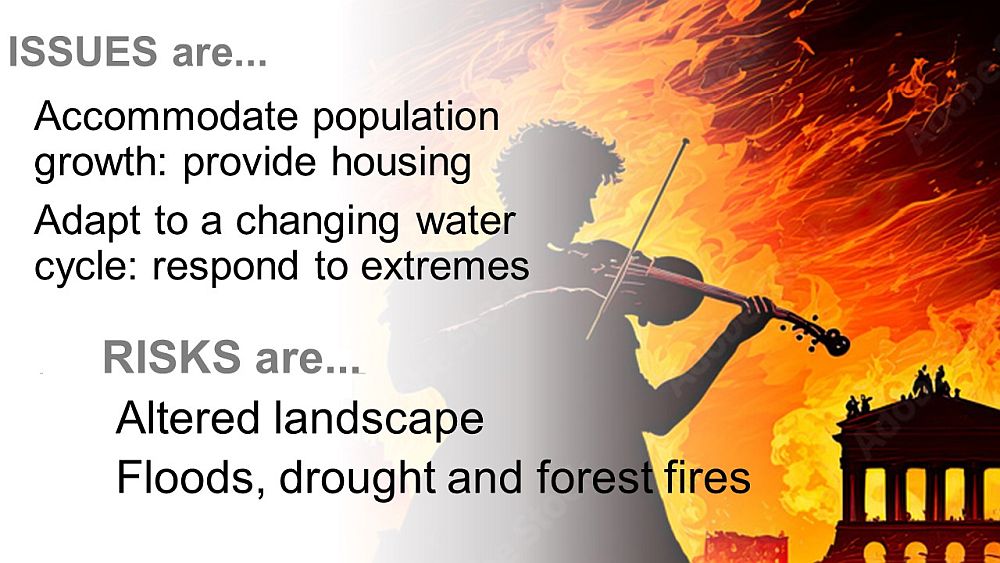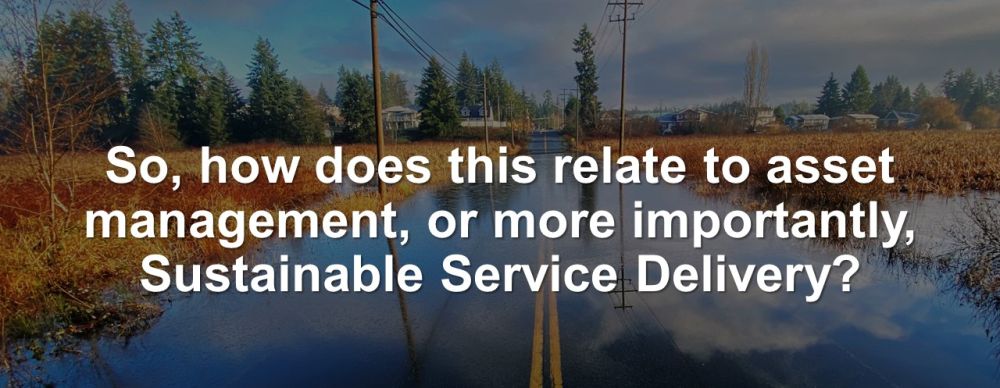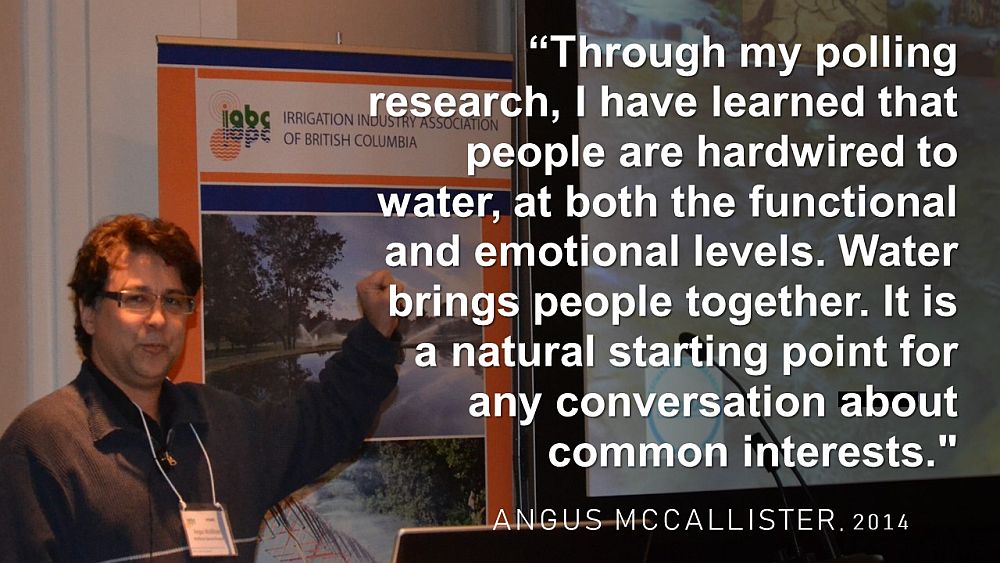ASSET MANAGEMENT FOR SUSTAINABLE SERVICE DELIVERY: “Through the power and magic of collaboration, BC communities can rise to the challenge and adapt to the new climate reality of seasonal extremes,” stated Kim Stephens, Partnership for Water Sustainability in British Columbia
Note to Reader:
Published by the Partnership for Water Sustainability in British Columbia, Waterbucket eNews celebrates the leadership of individuals and organizations who are guided by the Living Water Smart vision. The edition published on October 31, 2023 featured an article written by Kim Stephens for the Asset Management BC Newsletter. The underlying theme is about the elephant in the room: the asset management community has lost its way.

Overwhelmed communities are losing sight of the goal
The Partnership for Water Sustainability and Asset Management BC share common interests and are jointly operationalizing lynchpin action items identified in Living Water Smart in British Columbia. Our shared commitment to Living Water Smart actions provides the foundation for collaboration goals that are defined in a Memorandum of Understanding.
The umbrella for collaboration is Asset Management for Sustainable Service Delivery: A BC Framework, released in December 2014 by the Ministry of Municipal Affairs and Union of BC Municipalities (UBCM) through Asset Management BC.
The “BC Framework” is a call to action
An over-arching goal of collaboration is to advance a mutually supporting approach that profiles and raises awareness of the guiding philosophy, principles and objectives embodied in the BC Framework. This includes each entity publishing articles by the other.
As a longtime contributor to the Asset Management BC Newsletter, this gives me a good sense of their audience. So, when Wally Wells offered me an opportunity to stir the pot with a provocative article, I thought why not!
Elephant in the room:
Local government politicians and staff are being overwhelmed by the issues of the day. That is their current reality. As a consequence, folks are losing sight of the big picture and getting lost in the details. An elephant in the room is that the asset management community has lost its way.
In his editor’s essay, Wally Wells provided this supporting context: “I frequently hear comments and concerns about getting buy-in to asset management within the organization and with the elected officials. Recently I spoke to a mayor who said, “I do not understand what this is about” and added “we are already too busy with a very small staff!”

To download and/or share a copy of the current issue of the Asset Management BC Newsletter, CLICK HERE. Scroll to page 6 to read the “as published” version of the article below.
CONTEXT AND HISTORY DO MATTER: Droughts, Forest Fires, Floods and Sustainable Service Delivery
The issues are clear and so are the risks.
Climate change is accelerating

Governments have had two decades to prepare for the obvious and the inevitable. 2003 was the first of a series of “teachable years”, with the full onslaught of a changing climate hitting hard as of 2015.

Context and history do matter
When Asset Management BC was birthed circa 2010 as a companion initiative to the Partnership for Water Sustainability, I remember the strategic goal articulated by Glen Brown – to foster innovation and integration using the provincial grants program as a financial incentive to influence how communities manage land and water.
A memorable Glen Brown quotable quote from September 2009 captures the WHY and the WHAT behind the vision for sustainable service delivery as a driving force for innovation and integration:

The spotlight shone brightly on the notion of levels-of-service. And this led to the vision and game plan for Asset Management for Sustainable Service Delivery which Wally Wells has successfully spearheaded for all these years.
How well are we doing?
When I reflect on the Glen Brown quote, and recall the context, I lament the missed opportunity that his quote symbolizes. Sustainable service delivery should have been the engine for integration across disciplines, departments, and sectors. But that is not how it turned out.
When Glen Brown introduced the Sustainable Service Delivery concept in 2011 at our “course on a course correction for watershed planning” in Metro Vancouver, we at the Partnership for Water Sustainability were convinced that Sustainable Service Delivery would influence HOW communities develop land, use water, and protect streams. That was our big picture.

Viewed in the big picture context, it is no surprise that the asset management community has lost its way. We are observing this across sectors. Communities and local governments are being overwhelmed by the issues of the day, losing sight of the goal, and getting lost in the details.
Now what?
The past informs the future.
If done right, I see Asset Management for Sustainable Service Delivery as being at the core of Risk Management. SSD is a mechanism that can still be leveraged to achieve informed and superior planning for land and water.
It certainly helps that risk management is language that gets the attention of elected representatives. With risk management as the lens, an integrated approach to SSD would help them focus on levels-of-service and consequences for water, land, and finances.

Interweaving Indigenous oral history and Western water science represents an opportunity for BC communities to re-set and get the big picture right when it comes to the WHY, WHAT and HOW of tackling the clear and present risks associated with a fundamentally altered landscape.
What we in the Partnership are essentially talking about is Water Reconciliation. That means going back to the headwaters of where we got our relationships with water and with one another wrong; and then starting back down the river of time – this time together – with a full understanding of the importance of embracing a water-first approach to planning human interventions in the environment.

Local is the scale where actions matter
It is also accessible by a global audience on YouTube
The Blue Ecology video features Michael Blackstock, independent Indigenous scholar, in conversation with two representatives of local government: Richard Boase, North Vancouver District; and Brian Carruthers, former CAO who is now an independent strategic advisor to local governments across BC.
A message of hope
The Watershed Moment Team seeds the idea that hope lies within the spheres of influence for local governments — whether Indigenous OR non-Indigenous. At its heart, Blue Ecology is about embracing lessons learned from First Nations oral history, taking responsibility for care of the land, and handing off the intergenerational baton.
“Rather than looking through a cumulative effects lens, I also see the concept of ‘cumulative healing’ landing as a way to give back to water and land,” says Michael Blackstock.

Water brings people together
It is a natural starting point for any conversation about common interests, and by extension, our shared future. Stories unite us. Water does it. Pollster Angus McCallister proved that a decade ago:

A message of hope is paramount in these times of droughts, forest fires and floods. Through the power and magic of collaboration, BC communities can rise to the challenge and adapt to the new climate reality of seasonal extremes. Sustainable Service Delivery is essential to the solution.

Living Water Smart in British Columbia Series
To download a copy of the foregoing resource as a PDF document for your records and/or sharing, click on Living Water Smart in British Columbia: A message of hope is paramount in these times of droughts, forest fires and floods. The downloadable version includes a Bonus Feature – the complete essay by Eric Bonham.
DOWNLOAD A COPY: https://waterbucket.ca/wcp/wp-content/uploads/sites/6/2023/10/PWSBC_Living-Water-Smart_Eric-Bonham-on-lake-stewardship_2023.pdf


